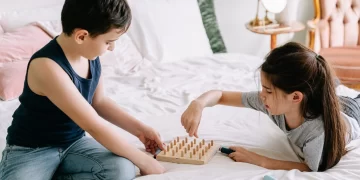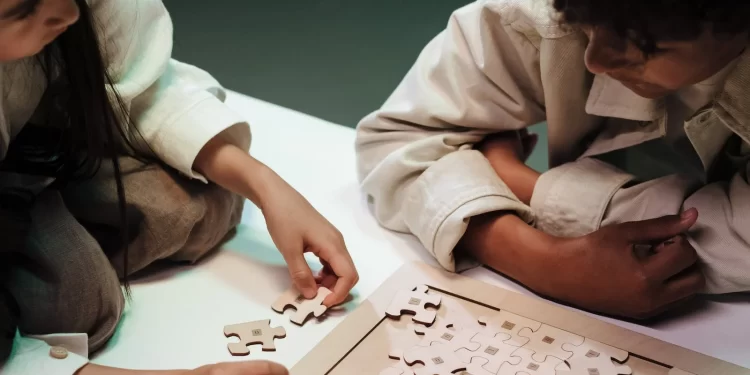
A board game is a game usually played with pieces on a board or some area with marked spaces. Creating a board game can be a fun and rewarding endeavor. Whether you’re crafting a game for family and friends or considering a commercial release, careful planning and attention to detail are crucial. Board games are tabletop games that typically use pieces. These pieces are moved or placed on a pre-marked board (playing surface) and often include elements of table, card, role-playing, and miniatures games as well.
Here’s a detailed guide to help you create your own board game:
1. Define Your Concept and Objectives:
- Concept: Clearly define the theme, genre, and overall concept of your board game. Consider what makes your game unique and enjoyable.
- Objectives: Determine the primary goals and objectives of the game. What do players aim to achieve, and how will they win?
2. Research Existing Games:
- Study existing board games, especially those within your chosen genre. Understand different game mechanics, components, and rules to gather inspiration and insights.
3. Outline the Game Mechanics:
- Define the core mechanics that drive your game. This includes movement rules, actions players can take, and how the game progresses. Consider turn structure and any unique features.
4. Create the Game Board:
- Design the game board layout. Consider the visual theme, spaces, and any special regions. Use graph paper or design software for precision.
5. Develop Game Components:
- Identify the necessary components, such as cards, dice, tokens, and playing pieces. Create prototypes of these components and iterate as needed.
6. Write Rules:
- Draft comprehensive rules that explain how to set up the game, play turns, and determine a winner. Ensure clarity, and use examples to illustrate key points.
7. Playtesting:
- Playtest your game extensively with a variety of players. Pay attention to feedback regarding balance, fun factor, and comprehension of rules. Modify the game based on playtest results.
8. Iterate and Refine:
- Based on playtesting feedback, make necessary adjustments to the game mechanics, rules, and components. Aim for a balanced and enjoyable experience.
9. Create Prototypes:
- Develop high-quality prototypes of your game components. This might involve professional printing, cutting, and assembling. Ensure that the prototypes are durable for continued playtesting.
10. Design Graphics and Artwork:
- Create or commission artwork for the game. Design visually appealing graphics for the board, cards, and other components. Consistent and attractive visuals enhance the overall gaming experience.
11. Manufacturing Considerations:
- If planning for commercial production, research manufacturing options. Obtain quotes from manufacturers and consider factors like materials, printing methods, and minimum order quantities.
12. Finalize Rules and Components:
- Once satisfied with playtesting and prototypes, finalize the rules and components. Ensure that all components are ready for mass production.
13. Create Packaging:
- Design the packaging for your board game. Consider how components will be stored, and include clear instructions on the box.
14. Launch and Marketing:
- Decide on a launch strategy. If seeking commercial release, consider crowdfunding platforms or traditional publishing. Develop a marketing plan to create awareness for your game.
15. Manufacture and Distribute:
- If producing the game commercially, coordinate with manufacturers for production. Once manufactured, plan for distribution through online platforms, local game stores, or other channels.
16. Gather Feedback and Updates:
- After the game is released, gather feedback from players. Consider releasing updates or expansions based on player input to keep the game fresh.
17. Legal Considerations:
- If applicable, consider trademarking the game name and ensuring that your game doesn’t infringe on existing intellectual property. Consult with legal professionals if needed.
18. Build a Community:
- Foster a community around your game. Engage with players through social media, forums, or events. Encourage discussions and share updates to maintain interest.
19. Continued Support:
- Provide ongoing support for your game. Address any issues that arise, release updates as needed, and consider expansions to extend the game’s lifespan.
20. Celebrate Success and Learn:
- Celebrate the launch of your game and any milestones achieved. Reflect on the process, learn from the experience, and use insights for future game design projects.
Benefits of playing board games as a family
Board games can bring people together and help parents to reclaim family time. Through games, parents can create an irresistible offline world that will restore balance, deepen relationships, develop transferable skills, and create shared, long-lasting memories. Playing board games offers a variety of benefits, making it a popular and enjoyable activity for individuals and groups. Here are some reasons why people play board games:
Family Bonding
Juggling the commitments of a family is no joke. As a parent, you are pulled in every direction from sun up to sun down – from work, school, running a household, and getting everyone to their events on time things can get a little hectic. Our lives get so busy and scheduled that we decided it was important that, as we do for dance and soccer, we make sure to schedule time for our family to just be together and bond; no places to be except home with each other.
We use this time to play games with our kids. Now, our kids are young, so it’s not always as idyllic as we go into it hoping it will be. But what we see is our kids engaged with each other learning to take turns, follow rules, make tough choices, and win or lose graciously. It’s time spent making memories and connecting.
Rather than sitting and watching a show, they are working together to solve problems and complete goals all in a fun, controlled setting. If there’s one thing we hope our kids look back on fondly as adults and incorporate into their own lives, it’s the importance of spending meaningful time together and finding joy in simple fun, whether that comes from a board game or not.
Games also allow us to have great date nights at home. Finding a sitter for four kids 6 and under can be hard, and after paying for the sitter, dinner, and perhaps a movie, we’ve racked up quite the bill. While we try to get out as often as we can, we also try to make sure that when we can’t we are still making time for us to be together and pursue one another.
We’ll put the kids to bed, come downstairs, and for a few hours we’ll take time to play a game. Maybe we’ll even spend what we would have spent on a date and get a new game to enjoy; when it comes to bang for your buck, you can’t beat buying a board game that you will be able to enjoy a countless number of times rather than just once.
Less Screen Time
Like most families, we are looking for ways to decrease the screen time in our family. And I’m not just talking about our kids. Technology is quickly taking over every aspect of our lives, we have the ability to have “smart” everything: smartphones, smart TVs, smart lightbulbs, smart toothbrushes smart speakers, and on and on! The pull of technology is everywhere and everyone has an opinion on what amount is good and what isn’t.
When we spend a night engaged in a board game, we walk away with memories, laughs, and a fun experience that can only come from face-to-face social interaction. Board games are incredibly versatile; you can take them with you to play indoors or out, and they open the door for a wonderful social experience with your friends and family where you can enjoy some friendly competition or even cooperative play and still engage in the great conversation that we all long for.
Brain Food
You’d be surprised by the level of mental engagement required to play modern board games. In games like Candyland, the winner is already determined before the first card has even been flipped – there is nothing you can do. But in today’s board games, you have a variety of styles, from puzzles to tactical area control games to keep you and your brain sharp and always thinking. The challenges provided by physical board games are better than anything you’ll find in some apps, even apps of the board games you might be playing.
The strategy required to play and win requires you can make touch choices and weigh your options, look at the board, and think not only about what the best move for you is but also the best move for your opponent and how to block them. Or they invite you to work together to solve problems as you play cooperatively.
And that is to say nothing of the reading and language skills required to interpret the rules, hand-eye dexterity enhancement, and math skills required to play the game itself. Whether you’re playing a difficult strategy game or a light-hearted party game, there are an endless number of options that invite you to think through a variety of mental challenges, making you perhaps just a bit smarter along the way.
Something for Everyone
As mentioned above, we have been hobbyist board gamers for the last ten years, which seems kind of crazy thinking about it. But over the years this really has developed into a passion for us. We board games for many reasons, more than even listed above, but the main reason is, without a doubt, for the experiences it provides for us and our family and friends. We love being able to gather around a table, phones aside, and spend time connecting with people, old friends and new.
The board game is really just a vehicle for us to bring people together and enjoy each other’s company. Over the last ten years we’ve had our fair share of friends and family that have told us that they “don’t like board games” and time and time again, we’ve found that there truly is something for everyone in this hobby.
You don’t have to like every game, we certainly don’t, but the diversity offered by today’s games is simply incredible and if you’ve made it this far down this post and are wondering where to start, then you’re in luck! What would a post about the benefits of board gaming with your family be if we didn’t give at least a few suggestions? This hobby is truly a joy and is something that we love to share with anyone who will let us especially our kids who have no choice! So without further ado, here are some board game ideas to get you started!
Social Interaction:
Board games can provide an opportunity for social interaction and bonding. Whether with family or friends, playing a board game fosters communication, cooperation, and friendly competition.
Entertainment and Fun:
Board games are designed to be entertaining. They offer a break from routine and provide a lighthearted way to spend leisure time. The element of challenge and strategy adds excitement.
Cognitive Skills Development:
Many board games require strategic thinking, problem-solving, and planning. Playing these games can enhance cognitive skills, including memory, critical thinking, and decision-making.
Stress Relief:
Engaging in a board game can be a relaxing and enjoyable way to unwind. It provides an opportunity to focus on an activity, diverting attention from daily stressors.
Healthy Competition:
Board games often involve friendly competition, allowing players to challenge each other in a controlled and enjoyable environment. Winning or losing is part of the fun and can teach sportsmanship.
Communication Skills:
Many board games require effective communication and teamwork. Playing these games can improve verbal expression, listening skills, and the ability to work collaboratively with others.
Why do people play board games?
To Be Social – Sitting down with some people and taking part in doing something together is the main draw of the board gaming hobby for me and many other gamers. Board games are a way to gather people together and have a shared experience. For many gamers, it’s the people at the table that make game night what it is and the game or games being played are secondary. People need to be around other people and gaming can be a great excuse to do so.
To Hang Out With Friends or Family – Some people only show up at game night to be with their friends. It doesn’t matter to them what the actual activity is, it can play games but they would show up if it was to watch movies or share a meal. Playing games is a great way to spend time with friends as well as get to know them better. There are even several games specifically designed to get to know your friends better and cooperative games work particularly well when played by friends.
A Way To Meet New People – Most of the people I now call friends I meet through gaming. One of the best things about board games is that everyone sitting at the table should already have at least one thing in common, a love of playing games. That common ground can often be expanded upon and turned into something more. While not everyone you game with will turn into lifelong friends, many will become people you enjoy meeting with and hanging out with if only to play games.
Being Part Of A Community – Just being a hobby board gamer makes you part of a community, a worldwide community of board gamers. In addition to that, there are a number of smaller more focused communities you may be part of. This could be an online forum dedicated to your favorite game, a local meet-up group, a Facebook page dedicated to a genre of games, or any other group that shares a common gaming-related interest. This feeling of belonging to something is the most important and can be a huge part of why people play games.
It’s Something To Do – For many people board games are just a way to pass the time. They are something to do while socializing or a way to kill time between things that, to those people, are more important. A lot of casual gamers feel this way, where board games are on the same level as listening to music or watching TV. This could include people who can show up to game night just to hang out as well as people who play digital board games in their spare time.
FAQ
What are board games called?
Also called table games, board games have a set of rules governing the play that usually have a defined beginning and end as well as a competitive element in trying to beat the other player.
What are popular board games?
Following chess, checkers, backgammon, Monopoly, and Scrabble are among the top five most popular board games. Whether you like to play the best card games or prefer to think 10 steps ahead in one of your favorite strategy board games, one of these classic board games will suit your taste.
What makes a successful board game?
A good board game must feature different gameplay modes that can provide satisfactory gameplay to all players. Some of the most common gameplay modes are local, multiplayer, computer, and play with friends. Make sure to integrate all of them to target a massive population of board game players.
Why do families play board games?
Board games can give children an opportunity to learn how to take turns, practice patience, work as part of a team, negotiate with others, compromise, communicate ideas, take risks, follow rules and directions, and manage restrictions. Players have to sharpen up social skills to be successful at playing games.
What makes a game casual?
A casual game is a video game targeted at a mass market audience, as opposed to a hardcore game, which is targeted at hobbyist gamers. Casual games may exhibit any type of gameplay and genre. They generally involve simpler rules, and shorter sessions, and require less learned skills.
In summary, playing board games is a versatile and enjoyable activity that brings people together, stimulates the mind, and provides a range of social, cognitive, and emotional benefits. Whether for entertainment, education, or relaxation, board games offer a valuable and engaging pastime.
Creating a board game requires a combination of creativity, strategic thinking, and attention to detail. Keep in mind that the process may involve multiple iterations, and being open to feedback will contribute to the success of your game. You can enjoy the journey of bringing your game from concept to reality!


































